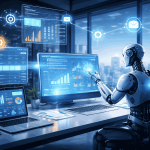
Potential Impact on Industries like Finance, Healthcare, and Logistics
Our world is evolving more quickly than most people ever imagined thanks to artificial intelligence (AI). It influences the way we work, learn, and shop. However, sectors like finance, healthcare, and logistics may be where it has the biggest impact. You’ll discover in this essay how AI is specifically making these industries safer, more effective, and easier to use.
The function of AI in each industry will be examined below, along with its effects on operations, customer service, and long-term growth. By the end, you’ll see why artificial intelligence (AI) is a reality with enormous promise rather than a sci-fi fantasy. Let’s get started.
AI’s Transformative Impact on the Finance Industry
Revolutionizing Financial Processes with AI
First, the way banks and other financial organizations identify fraud has been altered by AI. Conventional techniques depended on labor-intensive human examinations that frequently overlooked intricate frauds. Large volumes of data may now be analyzed in seconds by AI systems. They identify anomalous activity and highlight it for prompt action.
The use of AI in risk assessment and credit rating comes next. These systems take into account a variety of data, such as past payments and spending patterns. They assist lenders in making more accurate and timely lending decisions. By automating processes like data entry, AI also expedites financial reporting. Analysts can devote more effort to high-level plans as a result.
Personalized Financial Advice and Customer Service
Chatbots driven by AI are revolutionizing consumer interactions with banks. People may get immediate answers to common questions rather than having to wait on hold. Over time, these chatbots get smarter by learning from every query. By doing this, businesses lower labor expenses and raise customer happiness.
Lastly, AI makes customized financial advice possible. Artificial intelligence (AI) tools can provide customized investment programs by monitoring income and spending trends. They can also spot odd transactions or alert users when they spend too much. Better financial health and increased client trust in financial institutions are the results of this astute support.
AI-Driven Advancements in Healthcare
Enhancing Diagnosis and Treatment with AI
First, AI improves medical diagnosis speed and accuracy. AI can be used by doctors to examine patient data, such as imaging scans and test reports. This enables them to identify issues early and provide efficient treatment strategies. AI, for example, is able to identify cancers on a scan that the human eye could overlook.
AI then helps create individualized treatment regimens. In order to suggest treatments with greater success rates, it considers a patient’s lifestyle and genetic composition. This method enhances patient results and decreases the need for trial-and-error therapies. AI plays a key role in drug discovery as well, enabling quicker research and creation of novel medications.
Improving Patient Outcomes and Engagement
AI is more than just diagnosis. Additionally, it gives individuals more control over their own health. Physicians can take early action by using predictive analytics to identify health hazards. Wearable technology, for instance, measures physical activity levels and heart rates. AI turns this data into insightful knowledge that helps patients and physicians make wiser choices.
Lastly, AI facilitates remote patient observation. Even those who live distant from medical facilities can get the attention they need. Doctors may monitor symptoms from any location with the use of tools like telemedicine services and applications driven by AI. Additionally, this technology helps with the maintenance of medical records. It increases record accessibility, decreases errors, and expedites documentation.
Optimizing Logistics and Supply Chain with AI
AI-Powered Efficiency in Logistics Operations
First, warehouse management is dominated by AI. By identifying which goods must be positioned close to loading docks, it optimizes layout. Staff travel time is decreased, and order fulfillment cycles are shortened. AI is also used for jobs like product classification and inventory counting.
AI then makes it possible to trace shipments in real time. By examining weather, traffic, and other data, it forecasts delivery times. Businesses might use this information to notify clients of potential delays. Additionally, regular processes like scanning and sorting goods are sped up by AI-powered automation.
Lastly, AI improves inventory control. It examines marketing efforts, sales records, and seasonal patterns. AI makes more accurate demand estimates using these information. By doing this, businesses save time and money by avoiding stockouts and overstocking.
Streamlining Supply Chains for Enhanced Performance
Supply chain optimization is another area in which AI is heavily involved. Businesses may ensure they have just enough inventory by using predictive analytics to determine when to refill. As a result, the supply chain as a whole becomes more economical and efficient. Additionally, it lessens waste from out-of-date or expired goods.
AI then helps with dynamic pricing and route optimization. Delivery trucks can save fuel and minimize delays by taking the quickest routes. In the meanwhile, dynamic pricing modifies shipping charges according to space availability, distance, or demand. This adaptable strategy maintains operations and increases earnings.
Lastly, supply chain risk management is aided by AI. It highlights possible disturbances like natural disasters or unstable political environments. After that, businesses can move swiftly to identify other suppliers or reroute supplies. This preventative approach lessens the harm caused by unforeseen circumstances.
Conclusion
AI is radically changing logistics, healthcare, and finance. It provides customized advise and speeds up the detection of fraud in the financial industry. AI in healthcare expedites diagnosis and provides individualized care. Logistics teams, meanwhile, use AI to improve delivery reliability and expedite warehouse operations.
There appears to be limitless opportunity for additional AI development in these sectors. Every day, new techniques are developed that offer novel answers to long-standing issues. AI can improve your workflow, regardless of how big or small your company is. In a world that is changing quickly, you can maintain your organization’s competitiveness by remaining informed and welcoming new innovations.
FAQs
1. What are some real-world examples of AI in finance, healthcare, and logistics?
- Finance: AI-powered fraud detection systems and automated credit scoring.
- Healthcare: AI-assisted medical imaging for tumor detection and personalized treatment recommendations.
- Logistics: Real-time shipment tracking and route optimization software.
2. How will AI impact jobs in these industries?
AI will automate repetitive tasks. This may reduce the need for certain positions, like data entry clerks. However, it also creates new roles, such as AI trainers or data analysts. In the long run, AI can improve efficiency and open opportunities for skilled workers.
3. What are the ethical considerations of AI in these sectors?
Data privacy is a primary concern. AI often relies on large data sets, which can include sensitive information. Algorithmic bias is another issue. If developers are not careful, AI systems may favor certain groups over others. Responsible AI development and strict regulations are key to preventing these problems.
4. How can businesses get started with AI adoption?
Start small. Pick a specific problem you want AI to solve, like customer service or inventory management. Then define clear objectives and gather relevant data. Consider launching a pilot project to test AI solutions before full-scale implementation. Engage experts or consult with AI-focused firms if you need guidance.
Investigate the current tools and solutions if you’re prepared to take advantage of AI’s potential effects in the fields of banking, healthcare, and logistics. Continue to learn, maintain your curiosity, and don’t be scared to try new things. As AI advances, your company will have a greater competitive edge the sooner it makes the necessary adjustments.
Author Profile

- Online Media & PR Strategist
- Hello there! I'm Online Media & PR Strategist at NeticSpace | Passionate Journalist, Blogger, and SEO Specialist
Latest entries
 AI WorkflowsJanuary 30, 2026Agentic AI Workflows for Automating Business Tasks
AI WorkflowsJanuary 30, 2026Agentic AI Workflows for Automating Business Tasks Cloud ComputingJanuary 27, 2026Multi-Hybrid Strategy for Cloud Resilience and Vendor Freedom
Cloud ComputingJanuary 27, 2026Multi-Hybrid Strategy for Cloud Resilience and Vendor Freedom AI WorkflowsJanuary 26, 2026On Device AI Processing for Faster, Private Mobile Interfaces
AI WorkflowsJanuary 26, 2026On Device AI Processing for Faster, Private Mobile Interfaces AI WorkflowsJanuary 23, 2026AI Driven Threats: Deepfakes, Ransomware, and New Rules
AI WorkflowsJanuary 23, 2026AI Driven Threats: Deepfakes, Ransomware, and New Rules

